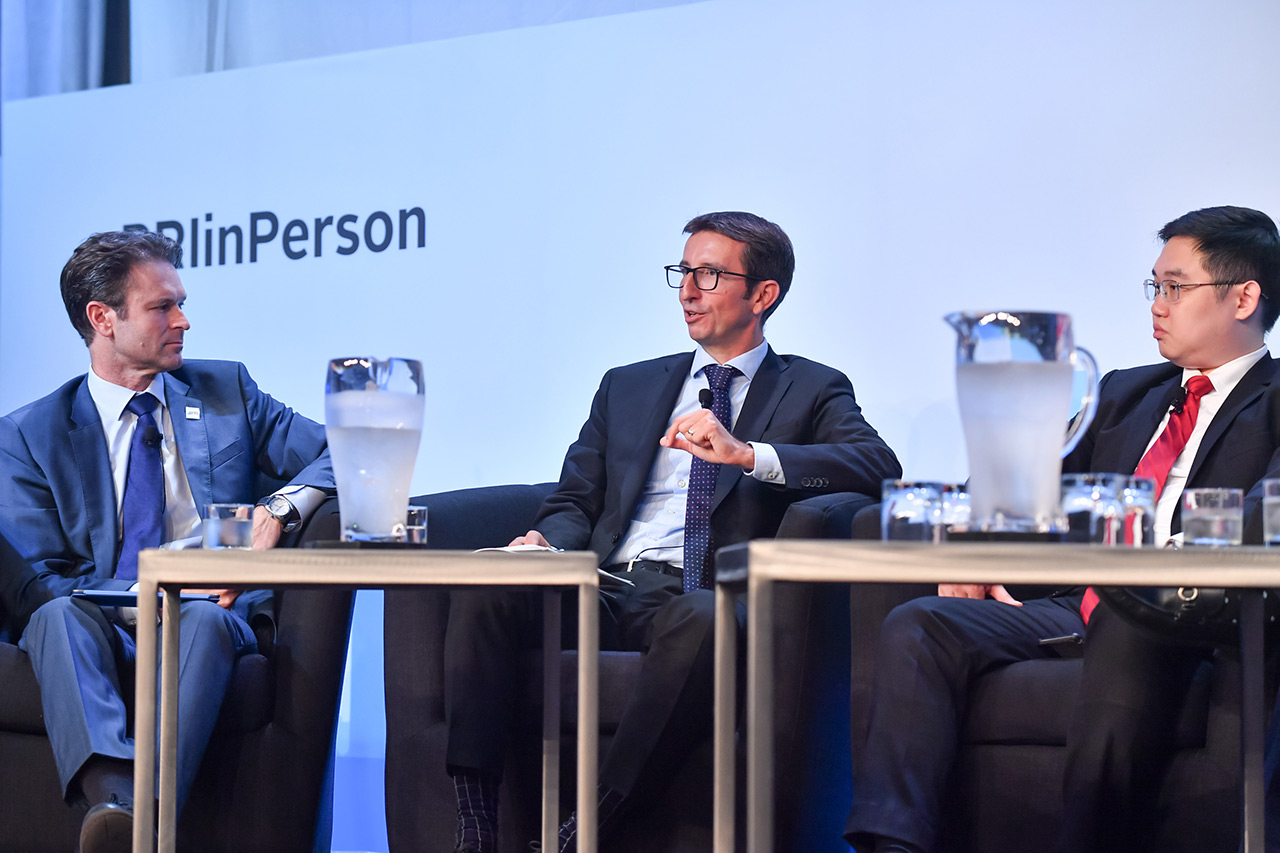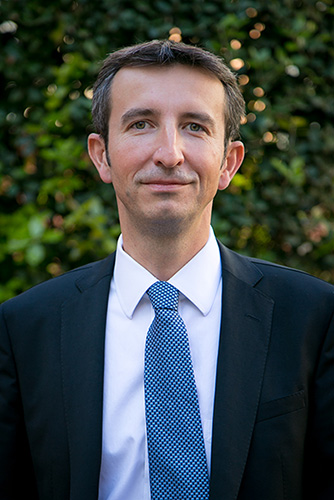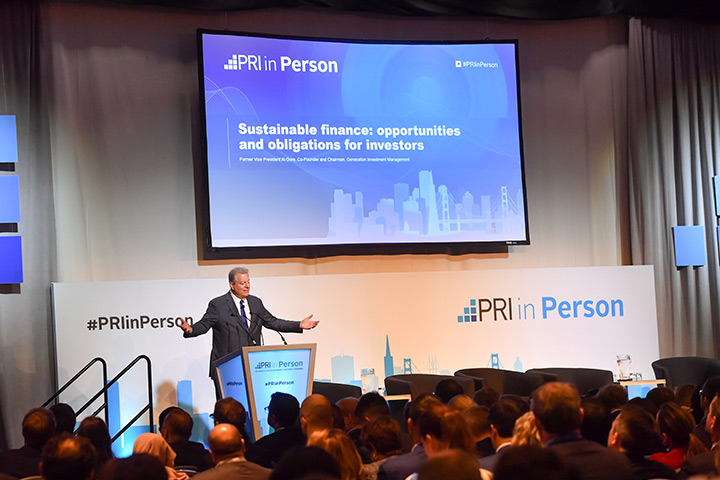EU's sustainable finance agenda going global

date: 28/09/2018
Martin Špolc, head of the Capital Markets Union unit in the Commission's Directorate-General for Financial Stability, Financial Services and Capital Markets Union, shares his impressions from a recent visit to the United States to discuss the Commission's sustainable finance strategy.
Sustainable finance rocks! In Brussels as well as around the globe.
Just two weeks ahead of the One Planet Summit on 26 September, where Vice-Presidents Valdis Dombrovskis and Maroš Ševčovič as well as Commissioner Neven Mimica represented the Commission and, together with French President Emmanuel Macron and other EU leaders reiterated Europe’s determination to lead the fight against climate change, I had the privilege to take part in two global events of major importance for the sustainable finance project. The Global Climate Action Summit and the annual conference of the Principles for Responsible Investment “PRI in Person”. Both took place in San Francisco.
Action and commitment
The Global Climate Action Summit was organized by California's Governor Jerry Brown with the support of American entrepreneur, philanthropist and former mayor of New York City Mike Bloomberg. The aim was to step up action and get new commitments from national leaders, mayors and businesses from around the world to fight climate change. The bottom-up drive of the 'Coalition of the Willing' – an alliance of US states and cities that are committed to the Paris accord and represent half of the population of the US, half of the US economy and more than a third of its nationwide green-house-gas emissions – is remarkable. Their efforts, in spite of President Trump’s decision to withdraw the United States from the Paris Agreement, have so far brought the US almost halfway to President Obama’s Paris pledge. Impressive. Commissioner Miguel Arias Cañete represented the Commission at the event and reiterated Europe’s commitment to deliver on the Paris goals.
Apart from defiance, the summit also provided a moving reminder of the dramatic reality in all parts of the world as well as the bleak prospect of climate change that will increasingly negatively affect all of us, one way or another. Only last year, disasters triggered by weather and climate-related hazards were responsible for thousands of deaths and more than €270 billion in economic losses.
Mobilisation of private financing emerged as one of the new powerful tools in speeding the transition to an inclusive, clean economy. At one of the sessions, seven young entrepreneurs presented their success stories with their innovative start-ups financing climate investments, resilience and energy access projects. They showed how ambition, determination and ability can make a difference on the ground. Inspiring examples, proving the power of combining some of the key ingredients promoted by our Capital Markets Union: start-up financing, venture capital, innovation, fin-tech and sustainability. It works! The summit also brought numerous announcements accelerating the issuance of green bonds – the most notable being the launch of the Global Green Bond Partnership to support the green efforts of cities, local governments and regions. The potential of green bonds is huge and underlines the importance of the ongoing work of the Commission’s technical expert group to develop an EU Green Bond Standard, due in June 2019.
Promoting EU policies
The annual PRI in Person event is the world's leading conference promoting sustainable and responsible investment. It gathers together more than 1,200 investors/asset owners managing €68 trillion (or USD 80 trillion) in assets, half of them from the US. I was invited to present the Commission’s work at the plenary and speak at six other affiliated events on sustainable finance, which was a perfect opportunity to promote the EU policies internationally.
Two leading figures in fighting climate change and promoting sustainability delivered inspiring speeches:
Former US Vice President Al Gore underlined what he sees as a global emergency and moment of a ‘fateful decision’, arguing that climate change is an existential threat. He quoted German economist Rüdiger Dornbusch: 'Crises take longer to arrive than you can possibly imagine, but when they do come, they happen faster than you can possibly imagine.' He called upon all involved – including investors – to act, and to act now. For Mr Gore, asset managers and institutional investors who do not integrate environmental, social and governance (ESG) factors are violating fiduciary duty. He hailed the European Commission as the global front-runner on sustainable finance. He specifically praised the initiatives on integrating ESG factors, in particular the legislative proposals on fiduciary duty and disclosure, calling them 'a real break-through'. Mr Gore believes that the sustainable revolution has the potential to change the world the way the industrial revolution did, but with the speed of the digital revolution. For him, this offers the biggest investment opportunities ever, in particular in the years to come.
Paul Polman, CEO of Unilever, outlined four priorities: 1) decarbonisation 2) transition to a circular economy 3) focusing financial markets on long-term strategies and 4) creating a more inclusive system and reducing global economic inequalities. He called upon both businesses and investors to live up to their responsibility; the tools are there, he said, the missing element is willpower. He argued for a shift away from capitalism that focuses only on maximising financial returns towards capitalism that maximizes returns on social and environmental capital. Companies truly integrating ESG will see an increase in their valuations; it pays off, he said. Mr Polman added that companies should see the UN Sustainable Development Goals as a perfect roadmap and great business opportunity. He also appealed to investors to engage actively with companies they invest in and to insist on responsible and long-term focused behaviour.
Some takeaways
The three day-long conference offered great panels with top-notch discussions. These are my three key takeaways:
- Global investors are stepping up their efforts: sustainability seems to be increasingly mainstreamed. However, the pace of progress is still too slow and most investors confessed they need to do more. A number of 'best in class' examples were presented, which demonstrated that responsible investment does NOT necessarily reduce returns, in particular over the medium to long term. An increasing number of investors recognised this as an opportunity but many argued that the 'lack of an appropriate policy framework' stops them from taking any bolder action.
- There is progress in the way investors integrate ESG, which appears to be mainly risk and client-demand driven. More tools and an increasing availability of ESG data and ratings make it easier for individual investors to judge what 'environmental sustainability' means. However, the overall quality and comparability of data remains uneven. Many agreed that investors and asset managers need to do their own ESG analysis and improve it, to be facilitated by more and better disclosure by businesses.
- There were some excellent discussions on the importance of more active engagement by investors with companies, and not only on the climate and environmental aspects of sustainability. As several speakers pointed out, there are also important social and governance issues that investors should enquire about to make their investment responsible. This way, investors can play a significant role in reducing global inequality.
Overall, many of the people I talked to expressed a great interest in the ongoing work of the EU. The global investors' community appears to appreciate the breadth and comprehensiveness of the issues that the EU action plan on sustainable finance covers. The EU is increasingly taking the lead in this area, with a bottom-up drive that is backed by political support and modern changes to the policy framework. This is unique and offers the potential to make the EU and its capital markets the global hub for sustainable investment, boosting the long-term competitiveness of the EU economy. Let’s grasp that potential together!


